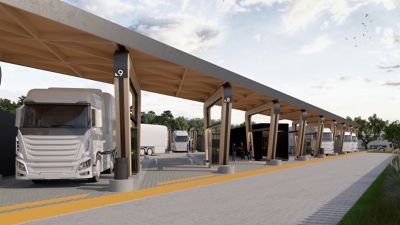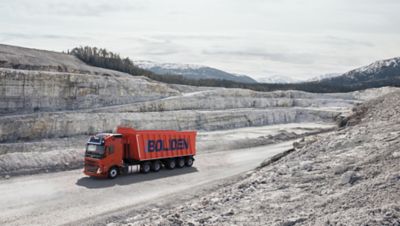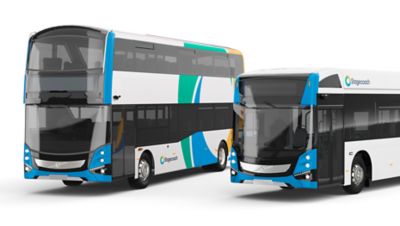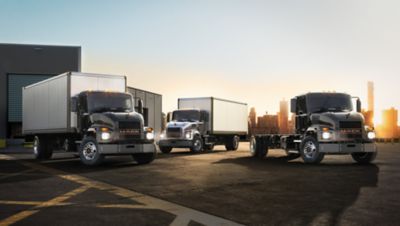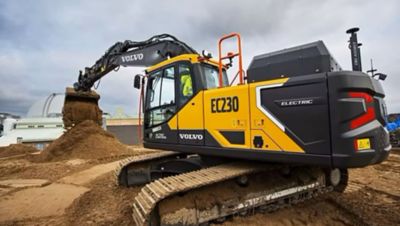Volvo Group Belgium
De Zweedse Volvo Group is één van de toonaangevende producenten van trucks, bussen, grondverzetmachines, motoren en aandrijvingen voor plezier- en bedrijfsvaartuigen evenals industriële toepassingen. De Gentse faciliteit is de grootste vrachtwagenfabriek van Volvo Group ter wereld. Volvo‘s volledige Europese gamma van zware vrachtwagens wordt er geproduceerd en geëxporteerd. Bovendien is de Volvo Trucks-fabriek in Gent sinds 2007 volledig CO2-neutraal.
De Gentse site is ook de thuisbasis van meerdere logistieke activiteiten, o.a. van het grootste distributiecentrum van de groep, Service Market Logistics. Daarnaast vind je er ook enkele Europese services terug zoals bijstand en pechverhelping voor chauffeurs (Volvo Action Service) en technische ondersteuning voor dealers (Technical Dealer Support).
Volvo Group Belgium
Volvo Group stelt in België meer dan 5.000 personen te werk, waarvan ongeveer 3.200 in de Gentse vrachtwagenfabriek.
Meer informatie over de Volvo-groep
Rekrutering
Dag in dag uit werken we samen met echte specialisten in hun vakgebied aan duurzame en efficiënte transport-en infrastructuuroplossingen. Met passie, energie en teamwork bouwen we aan een betere samenleving voor de generaties na ons. Volvo Group bestaat uit bijna 100.000 mensen wereldwijd die zich verbonden voelen door een bedrijfscultuur waarbij zorg, inclusiviteit en empowerment centraal staan. Ieder van ons – ongeacht geslacht, ras, leeftijd, capaciteiten of achtergrond – geeft elke dag het beste van zichzelf. Grote technologische vernieuwingen veranderen stilaan onze manier van leven. Wil jij écht een verschil maken? Kom werken bij ons en werk mee aan de toekomst van morgen.
Merken in de markt
Volvo Trucks, Volvo Bus, Volvo Penta, Renault Trucks, Volvo Construction Equipment
Alle activiteiten van de groep zijn vertegenwoordigd in België met Volvo Trucks en Renault Trucks voor vrachtwagens, Volvo Bus, Volvo Construction Equipment en Volvo Penta.
- Laatste nieuws
- Werken bij Volvo Group
- Mondiaal graduate programma
- Maatschappelijke betrokkenheid
Een overzicht van de laatste persberichten en artikels van Volvo Group Belgium.
26 matches
1 of
6
-
Press release
2023-11-23
Volvo Group Belgium pionier met zero-emissie mobiliteitshub in Gent
Volvo Group België kondigt, in samenwerking met Air Products en Milence, de intentie aan om een zero-emissie mobiliteitshub te ontwikkelen op haar Gentse site, en zet zo de volgende stap in haar duurzame transformatie.
-
Download het volledige persbericht (PDF, 88 KB)
-
-
Press release
2023-10-18
Volvo Group – derde kwartaal 2023
“In het derde kwartaal van 2023 bleef de Volvo Group betere resultaten, marges en winst neerzetten. Na aanpassing voor wisselkoersen is de nettoverkoop met 9% gestegen tot EUR 11,38 miljard. We verhoogden de aangepaste operationele inkomsten tot EUR 1,64 miljard (1,02), wat overeenkomt met een aangepaste bedrijfsmarge van 14,4% (10,3). We hebben met succes de kosteninflatie kunnen beperken door middel van prijsbeheer en we zijn verstoringen in de toeleveringsketen onder controle blijven houden. Het rendement op geïnvesteerd vermogen steeg tot 33,7% (27,4),” vertelt Martin Lundstedt, President en CEO.
-
AB Volvo – Report on the third quarter 2023 (PDF, 1 MB) -
Press Release – Volvo Group - the third quarter 2023 (PDF, 296 KB)
-
-
Press release
2023-07-19
Volvo Group – tweede kwartaal 2023
"In het tweede kwartaal van 2023 bleef de Volvo Group goed presteren, met aanhoudende groei en verbeterde winstgevendheid. Onze nettoverkoop steeg met 18 % naar EUR 12,2 miljard en de aangepaste operationele inkomsten verbeterden van EUR 692 miljoen naar EUR 1,9 miljard, wat overeenkwam met een aangepaste bedrijfsmarge van 15,4 % (11,6). Dankzij een sterke commerciële focus zijn we erin geslaagd om de marges te verbeteren en tegelijkertijd de kosteninflatie en toenemende verstoringen in de toeleveringsketen onder controle te houden", zegt Martin Lundstedt, voorzitter en CEO.
-
AB Volvo – Report on the second quarter 2023 (PDF, 1 MB) -
Press Release – Volvo Group - the second quarter 2023 (PDF, 272 KB)
-
-
Press release
2023-04-20
Volvo Group – eerste kwartaal 2023
"Tijdens het eerste kwartaal van 2023 zette de groei van de Volvo Group door en steeg onze winstgevendheid. De omzet steeg in alle business areas en in alle regio's. De netto-omzet steeg met 25% tot SEK 131,4 miljard, het hoogste cijfer tot nu toe in het eerste kwartaal. We verhoogden de aangepaste operationele inkomsten met SEK 5,7 miljard tot SEK 18,4 miljard, wat overeenkomt met een marge van 14,0% (12,0). Het rendement op geïnvesteerd vermogen steeg tot 30,3% (25,3). Een goede winstgevendheid is belangrijk opdat we kunnen blijven investeren in de grootste technologische ommekeer die onze industrieën ooit hebben gezien. Momenteel doen we investeringen in elektrische voertuigen met batterijen en brandstofcellen maar ook in verbrandingsmotoren", zegt Martin Lundstedt, President en CEO.
-
Volvo Group report on Q1 2023 (PDF, 8 MB) -
Press release – Volvo Group report on Q1 2023 (PDF, 246 KB) -
Presentation material (PDF, 2 MB)
-
-
Press release
2023-01-26
Volvo Group – vierde kwartaal en volledig jaar 2022
"In 2022 kende de Volvo Group een sterke groei alsook een goede winstgevendheid en cashflow. Voor het volledige jaar steeg de nettoverkoop met meer dan SEK 100 miljard gestegen tot SEK 473 miljard en het aangepaste bedrijfsresultaat tot SEK 50,5 miljard (41,0). De aangepaste bedrijfsmarge bedroeg 10,7% (11,0). Met een sterke operationele cashflow van SEK 35,3 miljard (29,4) eindigden we het jaar met een nettokaspositie van SEK 73,9 miljard in Industrial Operations, exclusief pensioen- en leaseverplichtingen. Dankzij onze sterke financiële positie kunnen we onze aandeelhouders een goed rendement blijven bieden en tegelijkertijd investeren in de transformatie van onze industrieën. De Raad van Bestuur stelt een gewoon dividend voor van SEK 7,00 per aandeel en een extra dividend van SEK 7,00 per aandeel", zegt Martin Lundstedt, President en CEO.
-
volvo-group-report-on-the-fourth-quarter-and-full-year-2022-en (PDF, 1 MB) -
230126-volvo-group-press-release-the-fourth-quarter-and-full-year-2022-en (PDF, 319 KB)
-
26 matches
1 of
6
Dag in dag uit werken we samen met echte specialisten in hun vakgebied aan duurzame en efficiënte transport-en infrastructuuroplossingen. Met passie, energie en teamwork bouwen we aan een betere samenleving voor de generaties na ons. Volvo Group bestaat uit bijna 100.000 mensen wereldwijd die zich verbonden voelen door een bedrijfscultuur waarbij zorg, inclusiviteit en empowerment centraal staan. Ieder van ons – ongeacht geslacht, ras, leeftijd, capaciteiten of achtergrond – geeft elke dag het beste van zichzelf. Grote technologische vernieuwingen veranderen stilaan onze manier van leven. Wil jij écht een verschil maken? Kom werken bij ons en werk mee aan de toekomst van morgen.
En jij gebeten door operations, IT of engineering? De wereldwijde Graduate-programma's van Volvo zijn afgestemd op jouw behoeften en zijn bedoeld om je de kans te geven jezelf te overtreffen.
Jouw ambitie om te groeien - professioneel en persoonlijk - is wat ons bedrijf welvarend maakt. Als wereldwijde organisatie bieden wij je via onze internationale afstudeerprogramma's de kans om tal van carrièremogelijkheden te ontdekken!
Elk jaar verwelkomen we meer dan 100 afgestudeerden in onze Graduate opleidingsprogramma's. Blader gerust door deze pagina's om ons beter te leren kennen en te ontdekken welk programma het beste bij jou past.
De Volvo Group benadert maatschappelijke betrokkenheid aan de hand van activiteiten met gedeelde waarde, rampenbestrijding, schenkingen en maatschappelijke ondersteuning. Dit omvat het stimuleren van initiatieven voor maatschappelijk verantwoord ondernemen (MVO), het aangaan van strategische partnerschappen en het aanmoedigen van de deelname van medewerkers aan vrijwilligerswerk.
